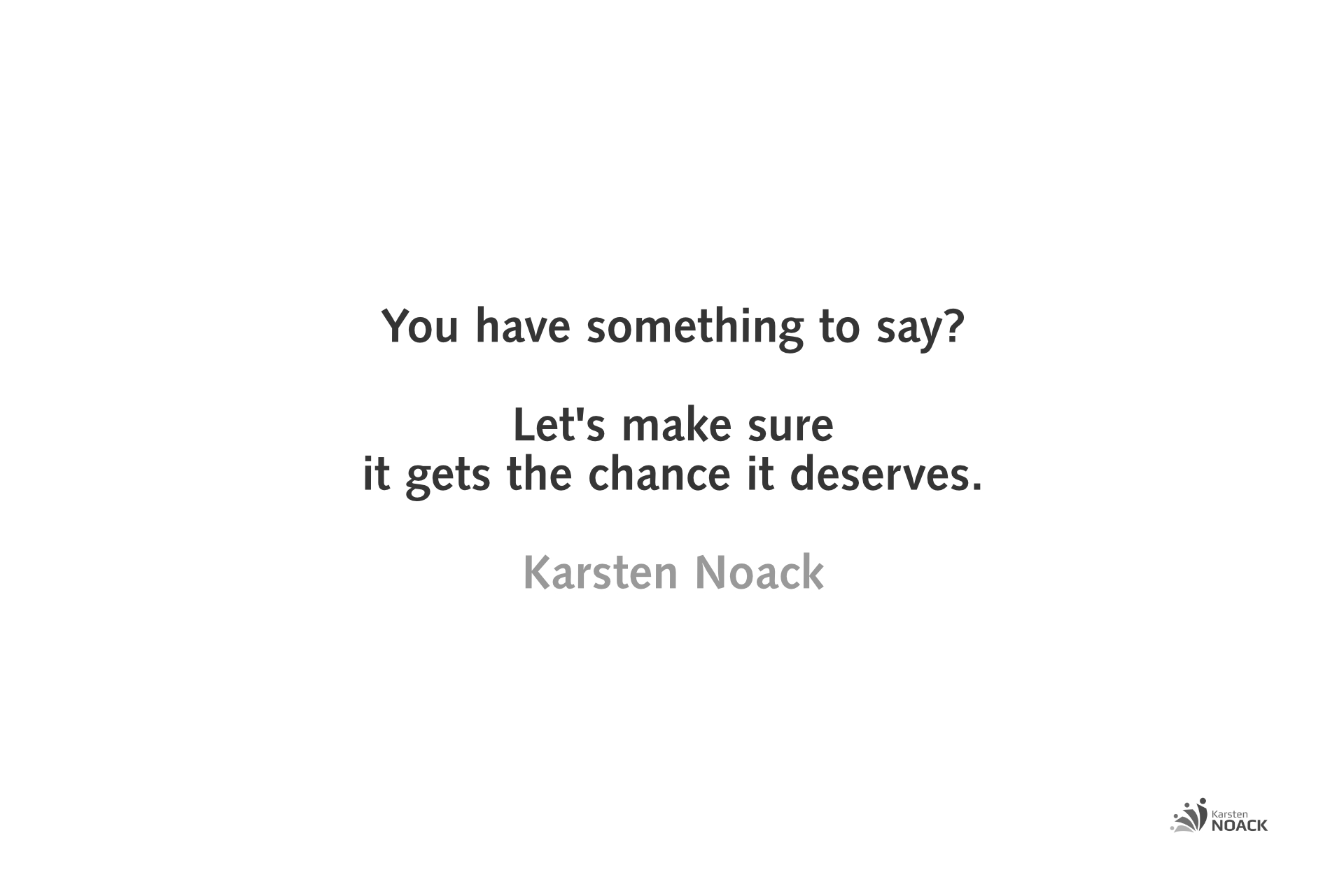Different Types Of Speeches And Presentations
Learn to chose your speech type based on the desired result
Types of speeches
There are many kinds of speeches. The most common types of speeches are those that can be used to convey a message, sell an idea, convince the intended audience, or convey knowledge. What types of speeches exist, when should they be used, what should be considered? Below is a list of some types of speeches and in the articles, you will find tips for their preparation and presentation.
Delivering a conference speech, pitching to a client for new business, making the most of a networking event, preparing for a job interview, or searching for some witty comments for an after-dinner speech – these are all challenges where I can help.
Overview
Different types of speeches
There are several ways to structure the different kinds of speeches.
4 groups of speeches
1. Informative speeches
An informative speech aims to inform and educate the audience by providing them with knowledge, particularly useful or interesting information.
There are many types of informative speeches. Informative speaking often focuses on speaking about people, events, processes, places, or things. In contrast to convincing speeches, an informative speech depends less on pathos than on the conveyance of information. It is hardly possible to inform an audience about one of these topics without convincing them of its importance.
2. Persuasive speeches
Convincing speech is the type of speech in which most people participate the most. A persuasive speech is given to convince the audience to feel and think in a certain way, to take a certain action, or to support a certain view or cause. Some forms of persuasive speeches are sales calls, court cases, and debates.
3. Entertaining speeches
Even convincing speeches should convey as clear a message as possible. The style of delivery used in an entertaining speech is typically different. Entertaining speeches have the potential to attract and retain the attention of the audience. They can also serve very serious purposes.
4. Speeches for special occasions
A speech on a special occasion may, for example, be a tribute to a personality, an institution, an event, an idea, or a location.
Speech types in the broader sense
The most common types of speech and occasions are:
- Farewell speech
- Address
- Acceptance speech
- After-dinner speech
An after-dinner speech is an occasion to create a sentiment of goodwill at the end of an important event. - Annual reception
- Argumentation
- Birthday speech
- Business presentation
- Candidature
- Closing words
- Closing remarks
- Closing statement
- Company party
- Company presentation
The main goal of a company presentation is to present the company to the target audience. Most of the time there is also another goal (secondary goal), because a company presentation usually serves as an introduction to a topic. - Convention speech
- Council meeting
- Debate
- Debate speech
- Demonstrative speech
- Discourse
- Discussion
- Dinner speech
- Eulogy
- Elevator-Pitch
An elevator pitch is a brief, persuasive speech that you use to spark interest in what you offer. - Entertaining speech
- Experience report
- Field report
- Filibuster
- Final speech
- Final statement
- Funeral speech
- Funeral oration
- Greeting
- Impromptu speech
An impromptu speech is a talk that you give on the spot with no preparation. - Inaugural
- Inaugural address
- Inaugural speech
- Keynote
- Kick-Off-Meeting
At kick-off meetings, executives want to prepare and motivate their employees for new tasks. - Laudation
A laudation is a eulogy in which merit is honored, most often that of a personality, sometimes of a group of people or an institution. The occasion may be an award ceremony or the honor of a person. - Lecture
A lecture is an informative speech in front of an audience, a lecture at conferences or in education. - Line of argument
- Line of reasoning
- Maiden speech
A maiden speech is the first formal speech given by a newly elected or appointed member of a legislature or parliament. - Marketing presentation
- Monologue
- Moderation
- Motivational speech
There are superficial motivational speeches with show performances that hurt and motivating speeches that evoke wonder. - Opening speech
- Oration
- Oratorical speech
- Pecha Kucha
- Peroration
- Persuasive speech
A persuasive speech is aimed at a defined goal. The speech is intended to convince the audience to work for a goal. In addition to the logic above all the emotions of the audience are addressed. - Pitch
- Pitch deck
A pitch deck is a brief presentation, often created using PowerPoint, Keynote, or Prezi, used to provide the audience with a quick overview of a business plan - Political speech
- PowerPoint presentation
- Presentation
A presentation is a speech in which specific content is presented to a target group in a structured manner using visual aids. - Product demonstration
- Product presentation
- Progress report
- Proof of Concept
- Reasoning
- Rehearsal talk
- Report
- Sales pitch
- Sales presentations
With a convincing sales presentation, potential customers should be impressed. - Sample lecture
- Special occasion speech
- Specialized lecture
- Specialist presentation
- Specialist lecture
- Speech
- Self-presentation
- Seminar
- Short lecture
- Short presentation
- Spontaneous speech
- Staff meeting
- Statement
All statements claim something or make a point. - Talk
- Thank-you-speech
- Testimonial
- Toast
Cheers! A toast is a call to drink in honor of a person or a concept - Training
- Unscripted speech
- Welcome address
- Welcoming address
- Welcoming speech
- Workshop
A workshop is an event in which a mostly smaller group works intensively on a topic.
Assistance in the preparation of speeches
Do you want to offer a good speech that convinces your audience? I can help you prepare your speech. You determine the type and extent of my support. I recommend at least a rehearsal with professional feedback. Then you will know how you and your speech influence the audience, what works and what you should not do. You will learn where there is room for improvement. Why should you wait and receive such feedback after your real event? Then it’s too late for any corrections.
The price for this professional support for your speech? You can find my fees here. You know best what the effort is worth in relation to the expected outcome. Benefit from my experience in marketing, psychology and communication science. This service is also available by phone or online with video support.
By the way: Many people suffer from very intense stage fright. With my help you can also solve that.
A good start: Professional feedback with suggestions for improvement
How persuasive are you and your messages in speeches and presentations? How good are you at the 111+ most important presentation skills? I have been analyzing speeches since 1998. After evaluating 14,375 speeches and presentations, and numerous mistakes of my own, most of which I only discovered after a delay, I can tell you exactly what works with which audience. Let me give you the feedback that will help you get ahead. You will receive essential feedback and recommendations, as well as the impulses you need to persuade your audience in concrete situations.
Are you interested? If so, here is how to get helpful feedback with recommendations for improving your speeches and presentations.
Just ask me personally
Please post any questions that may be of interest to other readers in the comments. Looking for professional help?
If you are interested in coaching, training or consulting, if you have organizational questions, or if you want to make an appointment, you can reach me best via this contact form (you can choose whether you want to enter your personal data) or via e-mail (mail@karstennoack.com). The privacy policy can be found here.
Transparency is important. That is why you will find answers to frequently asked questions already here, for example about me (profile), the services, the fees and getting to know me. If you like what you see, I look forward to working with you.
Remarks:
In the address bar of your browser, the URL should begin with "https://www.karstennoack.com/...". This indicates a secure connection (SSL). Whether you enter your real name is up to you.
This article is a short excerpt from the more comprehensive course materials my clients receive in a group or individual training or coaching.
Published: January 2, 2009
Author: Karsten Noack
Revision: August 12, 2019
Translation: August 12, 2019
German version: https://www.karstennoack.de/redetypen/
K:
H:
T: RR
#456

0 Comments